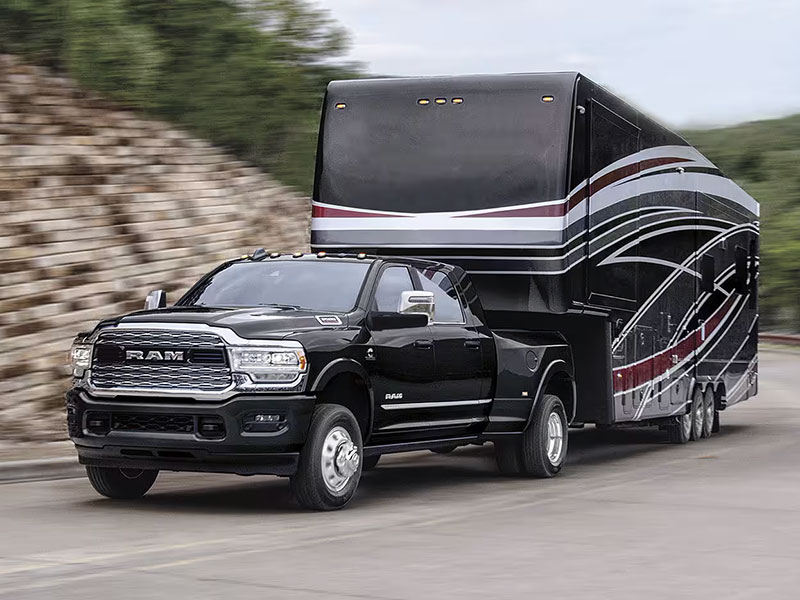When you have a Ram Truck, you've got a powerful partner for any hauling job. But having raw power isn't enough if you're not towing correctly. Proper hitching, safe loading, and thorough knowledge of regulations all come together to keep your precious cargo secure. Let's look at some essentials that will help you tow with confidence.
The Ultimate Guide to Towing with Ram Trucks: Hitching, Loading, and Safety Tips
Why Ram Trucks Excel at Towing
Ram Trucks are designed with tough frames, torque-rich engines, and sturdy suspension systems that handle substantial weight. According to Ram's official towing information, certain models can tow over 12,000 pounds when properly equipped. This means you can haul a boat, RV, or a trailer full of construction materials without breaking a sweat. If you're unsure about your specific model's towing capacity, always check the official Ram Truck website or your vehicle's manual for exact specs.
The Basics of Hitching
Whether you're using a conventional bumper hitch or a fifth-wheel setup, the key is to match the hitch class with your truck's capabilities. A small oversight like choosing the wrong hitch type could cause stability issues. Below are some basic tips:
- Weight Ratings: Make sure the hitch supports the gross trailer weight and tongue weight of what you plan to tow.
- Proper Ball Size: Different trailers have different ball sizes. Using the wrong one might damage your equipment or lead to an accident.
- Secure Connections: Double-check hitch pins and safety chains before hitting the road.
This trucks are built to handle big tasks, but you can't skip the details. A sturdy hitch is a major component of a safe journey, but it's not the only thing to consider.

Loading: Balancing the Weight
Loading your trailer is an art. To maintain stability, place about 60% of the weight in the front half of the trailer. Make sure it's distributed evenly side-to-side. If you're hauling a vehicle or multiple items, tie them down securely to keep them from shifting. Need tips on proper load distribution? The Federal Motor Carrier Safety Administration offers guidance on cargo securement that can help you, even if you're not a commercial driver.
Pay Attention to Tires
Underinflated tires reduce fuel efficiency and can cause handling problems. Overinflated tires wear down prematurely and ride harshly. The right pressure helps maintain traction and stability, especially under heavy loads. Check your truck's doorjamb for the recommended tire pressure, and monitor your trailer tires as well.
Braking and Handling
Towing changes how your truck brakes and handles. A heavier load means you need more distance to stop. That's where trailer brake controllers come in. If your Ram has an integrated trailer brake controller, adjust its settings based on how heavy your load is. This helps ensure the trailer brakes in harmony with your truck, rather than pushing against it. For advanced towing tips, AAA's safe towing guide provides useful pointers to keep in mind.
Mindful Driving Habits
Once on the road, keep these habits in check:
- Lower Speeds: Drive a bit slower than usual to maintain control.
- Gentle Acceleration and Braking: Sudden moves can unsettle your trailer.
- Wide Turns: Remember your trailer's swing radius when cornering or changing lanes.
Safety Checks and Routine Maintenance
Before you embark on a long trip, inspect your hitch assembly, trailer lights, and safety chains. It definitely helps you avoid roadside hassles. Also, keep up with routine maintenance. A well-maintained Ram Truck is less likely to have mechanical issues while hauling heavy loads.
Ready to Tow? Visit Elmwood CDJR in East Providence
Curious about which Ram Truck suits your towing needs? Elmwood CDJR in East Providence, RI, has a variety of models ready to show you what they can do. Our team can help you find the perfect towing package, explain key features, and even connect you with financing options that fit your budget.
Bottom line: Towing with a Ram Truck is all about matching the right equipment, practicing good loading habits, and staying alert on the road. Follow these guidelines, and you'll be hauling like a pro in no time.